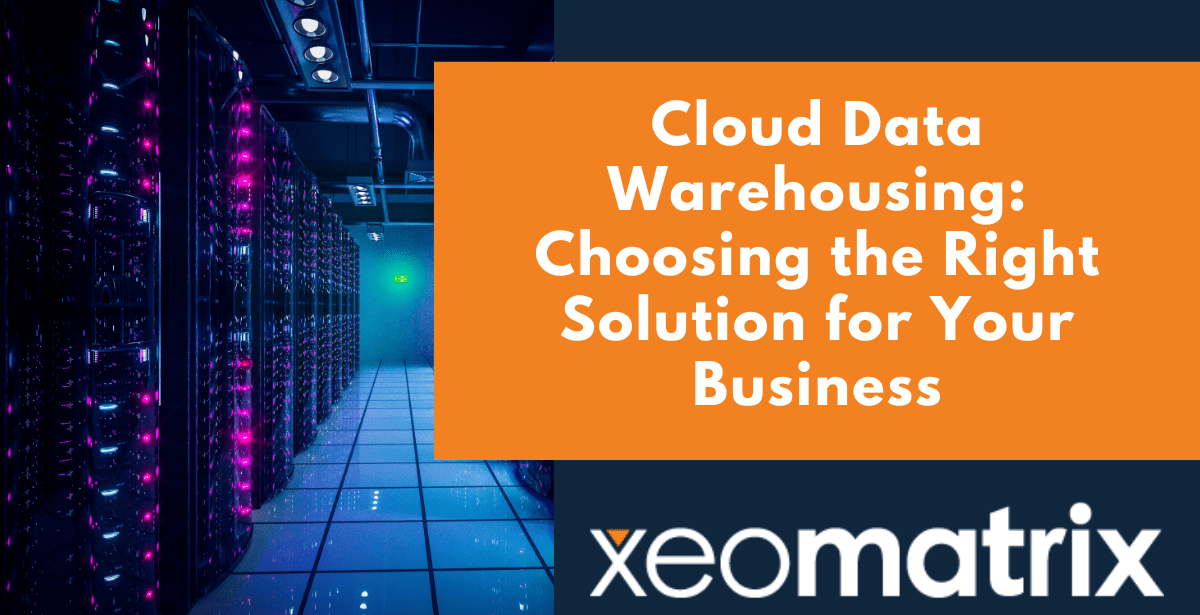Cloud data warehousing enables companies to centralize their data, scale efficiently, and unlock powerful analytics capabilities that support faster, smarter decision-making.
With several options available, understanding the trade-offs between platforms is essential to choose the best fit for your business needs. At XeoMatrix, we help clients navigate this complex landscape every day.
In this article, we’ll break down the key considerations and compare five leading cloud data warehouse solutions: Google BigQuery, Amazon Redshift, Snowflake, Microsoft Azure Synapse Analytics, and Teradata Vantage.
What to Consider When Choosing a Cloud Data Warehouse
Before evaluating tools, start by identifying your business’s unique data needs:
- What types of data are you storing? (structured, semi-structured, unstructured)
- Do you require real-time insights or batch analytics?
- What tools does your team already use (e.g., Google, Microsoft, AWS ecosystems)?
- How much control or automation do you need over scaling and performance?
- What’s your budget and pricing model preference? (pay-per-use vs. reserved capacity)
Beyond functionality, it’s crucial to evaluate consistency vs. availability tradeoffs. According to the CAP theorem, a distributed system can only fully support two of three factors: Consistency, Availability, and Partition Tolerance. Cloud data warehouses must choose between consistency and availability—making your use case a deciding factor.
Platform Comparison: Top Cloud Data Warehousing Solutions
Google BigQuery
Google BigQuery is a fully managed, serverless data warehouse that enables lightning-fast SQL queries using Google’s cloud infrastructure. It is designed to scale automatically with zero infrastructure to manage, making it ideal for real-time analytics across massive datasets. BigQuery uses a columnar storage format optimized for analytical workloads and supports built-in machine learning through BigQuery ML. With multi-cloud capabilities via BigQuery Omni and native integration with Google Cloud tools, it’s an excellent fit for companies operating in a Google-first environment.
- Strengths:
- Fully serverless and scalable
- Columnar storage for efficient querying
- Built-in machine learning capabilities
- Tight integration with Google Cloud services
- Supports multi-cloud analysis (via BigQuery Omni)
- Challenges:
- Cost depends on query performance and optimization
- Learning curve for clustering and partitioning
- Best suited for teams already using Google Cloud
- Best for:
Organizations prioritizing real-time analytics, cost-efficiency, and machine learning in a serverless architecture, especially those using Google Cloud tools.
Amazon Redshift
Amazon Redshift is a mature and robust cloud data warehouse optimized for high-performance querying and scalable analytics. Built on PostgreSQL, it is familiar to SQL users and integrates deeply with the AWS ecosystem. Redshift supports massive volumes of data and enables users to run complex analytics with support from features like Redshift Spectrum, which lets you query data directly in S3. While newer features like RA3 nodes separate compute and storage, heavy write operations can still impact performance during analytics.
- Strengths:
- Deep integration with AWS services
- Supports large-scale, structured data workloads
- Redshift Spectrum allows querying S3 directly
- Strong community and wide tool compatibility
- Challenges:
- Compute and storage are still partially coupled
- Requires tuning (sort/distribution keys) for optimal performance
- Higher setup complexity compared to newer platforms
- Best for:
Enterprises already in the AWS ecosystem need consistent performance for structured data workloads, such as finance, healthcare, or enterprise reporting.
Snowflake
Snowflake is a cloud-native, multi-cloud data platform that separates compute, storage, and services to deliver flexible and scalable data operations. It supports structured and semi-structured data (JSON, XML, Avro, Parquet) and offers a user-friendly experience for teams with varying technical backgrounds. Its per-second pricing and ability to scale compute independently make it cost-effective for dynamic workloads. Snowflake also shines in data sharing and collaboration, allowing near-instant access to shared data across regions and cloud providers.
- Strengths:
- Separates compute and storage for flexible scaling
- Supports semi-structured data formats
- Per-second pricing is cost-efficient for on-demand queries
- Easy to use, with minimal infrastructure overhead
- Multi-cloud deployment across AWS, Azure, and GCP
- Challenges:
- Custom visualization or dashboarding requires external tools
- Costs can escalate with frequent, complex queries
- Requires a governance strategy for sharing and access control
- Best for:
Mid-to-large businesses that want multi-cloud flexibility, semi-structured data support, and self-service analytics without complex infrastructure management.
Microsoft Azure Synapse Analytics
Azure Synapse Analytics is Microsoft’s integrated analytics service that brings together data warehousing and big data capabilities in a single platform. It supports both relational (SQL) and big data (Spark) processing and is deeply integrated with the broader Microsoft ecosystem, including Power BI and Azure Machine Learning. Synapse uses Massively Parallel Processing (MPP) to query large datasets efficiently and supports both batch and streaming pipelines. It’s ideal for companies already using Microsoft tools and services.
- Strengths:
- Combines SQL and Spark-based processing in one workspace
- Tight integration with Power BI and Azure tools
- Handles both structured and unstructured data
- Designed for high-throughput OLAP workloads
- Strong enterprise-grade security and compliance
- Challenges:
- Steep learning curve for teams unfamiliar with Azure
- Less compatible with non-Microsoft environments
- Can be more expensive under heavy workloads
- Best for:
Enterprises already invested in the Microsoft ecosystem, especially those needing a unified solution for structured and unstructured data analytics.
Teradata Vantage
Teradata Vantage is a modern enterprise analytics platform that unifies data lakes, warehouses, and AI/ML analytics into a single cloud-native solution. It supports multi-cloud and hybrid deployment models and handles diverse data types with high concurrency. With native support for languages like SQL, R, and Python, and integrations with tools like Jupyter and RStudio, Vantage caters to both business users and data scientists. It excels in performance optimization, advanced workload management, and governance—making it suitable for large, complex enterprise environments.
- Strengths:
- Unified platform for analytics, data lakes, and ML
- Hybrid and multi-cloud deployment flexibility
- High-performance processing for large workloads
- Strong support for governance and compliance
- Open-source tool and language integrations (SQL, Python, R)
- Challenges:
- May require specialized expertise to set up and maintain
- Enterprise-focused with higher pricing tiers
- Best value seen at scale, which may not suit smaller teams
- Best for:
Large enterprises with high-volume, high-complexity workloads spanning analytics, data science, and hybrid cloud environments.
Final Thoughts: Making the Right Choice
There’s no one-size-fits-all answer when it comes to cloud data warehousing. Your decision should be rooted in your business’s current needs and future goals. Here’s a quick cheat sheet:
| Platform | Best For | Strength |
|---|---|---|
| BigQuery | Real-time analytics, Google Cloud users | Serverless, scalable, ML-ready |
| Redshift | AWS users, banking/finance, consistency | Mature, strong SQL ecosystem |
| Snowflake | Multi-cloud enterprises, semi-structured data | User-friendly, auto-scaling |
| Azure Synapse | Microsoft ecosystem, hybrid data | Unified analytics, Power BI integration |
| Teradata Vantage | Large enterprises with complex needs | Flexible deployment, advanced analytics |
If you’re unsure where to begin, consider working with a data consulting firm like XeoMatrix. We specialize in helping businesses identify and implement the right data strategy—from selecting the best-fit warehouse to building optimized, scalable analytics solutions using Tableau and other leading platforms.
How XeoMatrix Can Help You Succeed with Cloud Data Warehousing
Cloud Data Warehouse success depends on how well your solution is implemented, optimized, and integrated into your broader data strategy. That’s where XeoMatrix comes in.
As a trusted data consulting partner, XeoMatrix specializes in helping businesses of all sizes make more intelligent decisions with their data.
With XeoMatrix, you get:
- Unbiased platform guidance based on your unique data, budget, and technical requirements
- End-to-end implementation support for cloud warehousing platforms
- Data architecture and modeling that sets the foundation for efficient analytics
- Seamless integration with tools like Tableau, Fivetran, Matillion, and other modern BI and ETL solutions
- Performance tuning and cost optimization to ensure your warehouse runs efficiently
- Training and documentation to empower your team for long-term success
We implement tools and build tailored solutions that align with your goals, scale with your growth, and unlock the full value of your data.
Ready to get started? Contact us today to speak with a cloud data expert and find the right data warehousing solution for your business.

